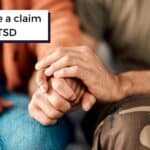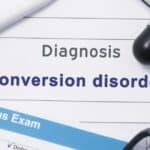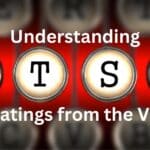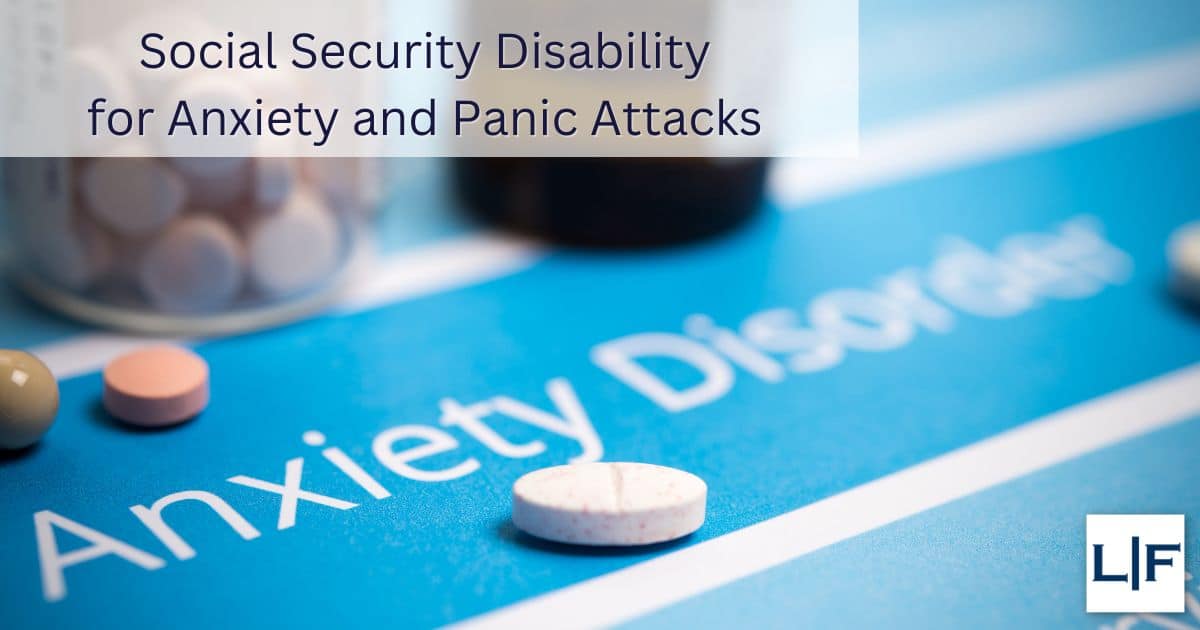Disability for anxiety and panic attacks is available to individuals who cannot work due to the severity of their symptoms.
Panic disorders are not uncommon. An estimated 8.6 million American adults have some type of panic disorder, estimates the National Institute of Mental Health (NIMH). Various types of panic disorders and related anxiety disorders are so oppressive that they can severely impair all aspects a person’s life, from relationships to work. With a panic disorder, the fear of recurrent panic attacks can become so overpowering that the person avoids triggers at all costs, such as crowded places or interactions.
For help getting Social Security disability for a panic disorder call a disability lawyer at Lunn & Forro, PLLC and schedule a free consultation: 888-966-6566.
Can you get disability for anxiety?
In its Blue Book (“the Listings”), the Social Security Administration (SSA) provides a Listing of Impairments and the criteria you need to meet for the SSA to deem you disabled.
Section 12.06 provides the criteria for applicants with anxiety disorders, such as panic disorder and phobic disorders.
Not all panic disorders qualify for disability; your condition must be severe. You must be able to satisfy the following two requirements:
First, you must have medically documented findings of at least one of the following:
- Panic attacks followed by “persistent concern or worry” about the potential of another panic attack and its consequences
- “Disproportionate fear or anxiety about at least two different situations” (e.g., leaving the house, being in an open or crowded space, standing in line at the grocery store, etc.)
Second, you must meet one of the following criteria:
- “Extreme limitation of one, or marked limitation of two, of the following”: ability to understand, recall, or use information; social interaction; concentrating and maintaining pace; or adapting and managing yourself
- Evidence that your panic disorder is “serious and persistent” (i.e., has lasted two years; you are currently undergoing treatment to lessen your symptoms; and you are unable to adapt to changes to your environment or schedule)
Can I still qualify for benefits if my condition does not quite meet the criteria?
Even if your panic disorder does not quite meet the description above, you may still be able to qualify for disability benefits if your condition is severe enough that you cannot engage in what the SSA calls “substantial gainful activity” or SGA.
If you are earning more than a certain amount each month, then the SSA will consider you engaged in SGA and you will not qualify for benefits. (In 2021, the SGA ceiling is $1,310/month.)
It can be challenging to prove a disability to the SSA when your condition is not on the Listing of Impairments or does not meet the specifications. Our team will examine your case and gather any evidence necessary to prove that you deserve benefits.
What other criteria is necessary to obtain disability benefits?
In addition to proving that you have a condition that is disabling, there are certain other criteria you will need to win your benefits:
- A doctor must expect your condition to last a year or longer or result in death.
- Despite treatment, your panic disorder is so severe that you cannot engage in SGA.
- Given your condition, age, education, and skill sets, you are unable to adjust to different work.
You must also meet either work credit requirements [for Social Security Disability Insurance (SSDI) benefits] or income/asset limits [for Supplemental Security Income (SSI)]. The SSDI benefit program requires that you have a certain number of work credits on your record. These are credits that you earn by working at a job and paying Social Security taxes. The number of credits you need depends on your age.
The SSI program is for children, visually impaired persons, and other disabled people that have limited assets and who have never worked or have not worked long or recently enough to qualify for SSDI. To qualify for SSI, your income and assets must fall below a certain threshold.
To learn more about the differences between SSDI and SSI, read our blog post on the subject.
How to I prove my panic disorder disability case to the SSA?
Medical and other supportive evidence is the crux of a disability claim.
To support your claim, you should include a detailed description of your typical reaction. You should also note how often it happens, how long it lasts, and any factors that brought on the attack.
The SSA will also consider your personal account of how your panic disorder is limiting your ability to work, as well as input from your family members, coworkers, social workers, employer, etc.
It is important to note that the number one reason disability claims receive denials is insufficient medical evidence. We will review your case to see if you meet the SSA’s stringent medical evidentiary requirements, as well as help you obtain the records necessary to prove your case.
What do I do if the SSA has denied my application for disability benefits?
If you received a benefits denial from the SSA, call Lunn & Forro, PLLC to discuss making an appeal. We can help you with several levels of appeal, beginning with requesting a reconsideration with the SSA.
It is vital not to delay in taking action, though, because you have only 60 days from the date you received your denial letter to make an appeal. Contact our office today to discuss your disability case: 888-966-6566.
Related Posts

What are the Disability Listings for a Social Security Claim?
The disability listings can make it easier for you to qualify for Social Security disability benefits. If you are considering filing an application for Social

How do I file a VA claim for PTSD?
If you are filing a claim for PTSD, you need to complete VA form 21-0781 to submit with your application for VA compensation. This form

Can You Get Disability for Conversion Disorder?
Conversion disorder is a mental illness that causes neurological symptoms, such as paralysis or hearing loss. It is one of several conditions that fall under

Understanding VA Ratings for PTSD
If you are a veteran that lives with post-traumatic stress disorder (PTSD), you may qualify for VA disability benefits. Receiving approval for your claim can
Getting Social Security Disability for a Mental Illness
There are various mental illnesses that can qualify someone for disability benefits. In fact, approximately one-third of disability beneficiaries received a mental disorder diagnosis in
Is BPD a Disability? – Qualifying for Payment
Some people who suffer from Borderline Personality Disorder qualify for disability benefits. Personality disorders are characterized by unhealthy and rigid thoughts and behaviors that greatly
Is PTSD a Disability?
Post-traumatic stress disorder (PTSD), which can develop after exposure to an extremely traumatic event, is not uncommon. According to the Department of Veterans Affairs (VA),
Is an Eating Disorder a Disability?
Can I get disability for an Eating Disorder? Eating disorders can cause a host of mental, emotional, and physical symptoms that can lead to serious



